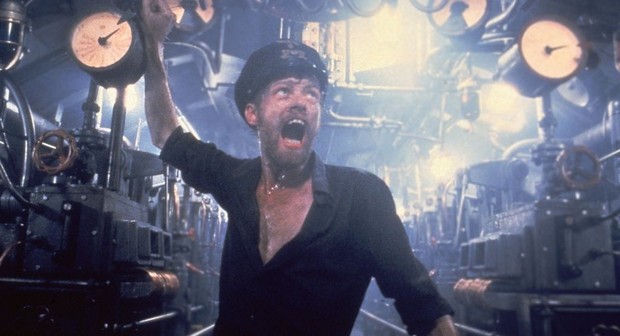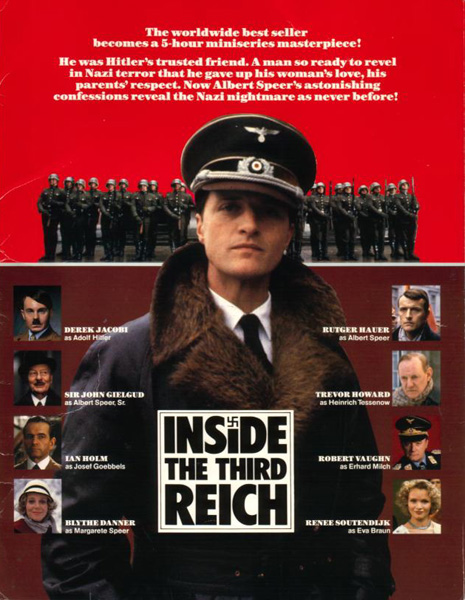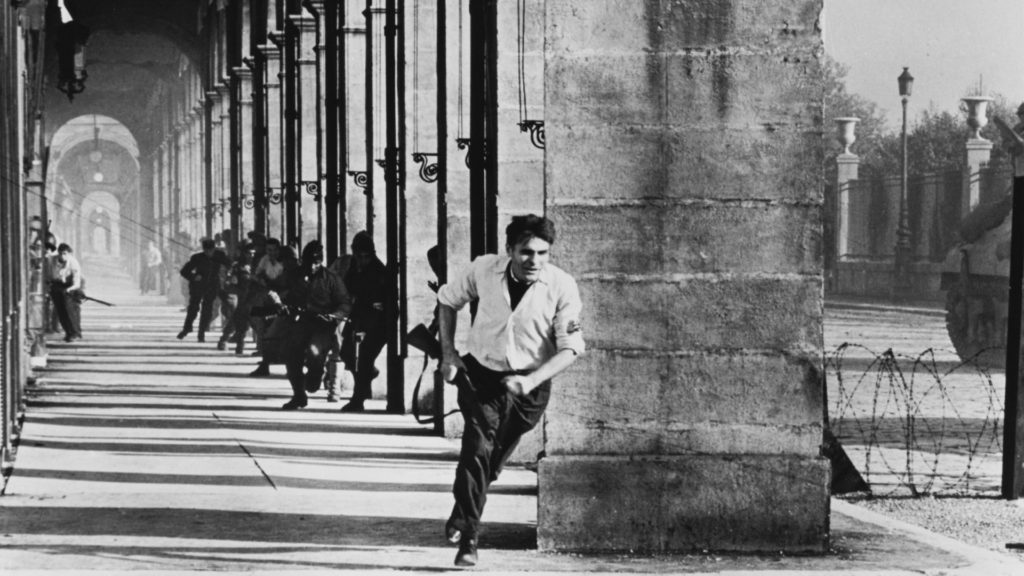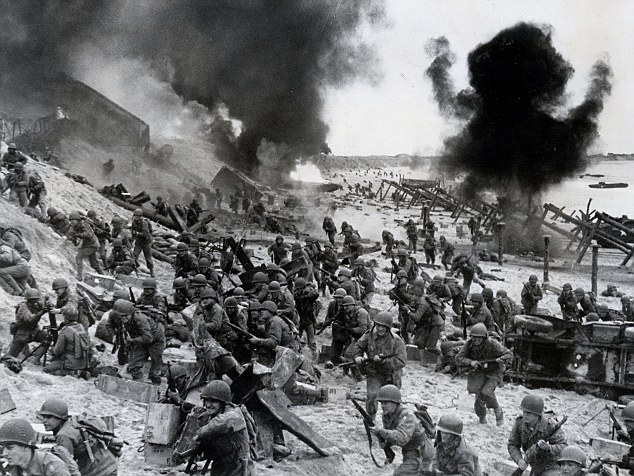Inside The Third Reich (1982)
CAST:
Rutger Hauer, Blythe Danner, Sir Derek Jacobi, Sir John Gielgud, Sir Ian Holm, Maria Schell, Trevor Howard, Elke Sommer, Stephen Collins, Renée Soutendijk, Randy Quaid, Robert Vaughn, Michael Gough, Maurice Roëves, Derek Newark, David Shawyer, George Murcell, Viveca Lindfors, Zoë Wanamaker
REVIEW:
Inside The Third Reich, a lengthy, critically acclaimed TV miniseries from two-time Emmy winner Marvin J. Chomsky, is a film adaptation of the same-named memoirs by Albert Speer, a bright, cultured German architect who became Adolf Hitler’s personal designer and later Minister of Armaments and War Production, ultimately spending twenty years in Spandau Prison for his use of slave labor to keep the German war effort going, during which time he ostensibly reflected on his errors in judgment and began to write his memoirs. Although forbidden to do so in prison, Speer smuggled them out through a sympathetic guard and formed them into an autobiography upon his release. As one of the few surviving individuals to have had such intimate contact with Hitler, Speer lived well off of book sales until his death shortly before its film adaptation. While many believe Speer to have downplayed his own role in the Third Reich, and criticize the miniseries for not questioning his account, its historical value is undeniable. Inside The Third Reich was filmed on a low budget over a few months of winter in Munich, which is made apparent by the presence of snow in nearly every outdoors scene throughout the miniseries. While the vast scope and detail of Speer’s writings require numerous events to be skipped over, it serves to give the viewer the basics of the workings of the Third Reich. Continue reading
Das Boot (1981)

DIRECTOR: Wolfgang Petersen
CAST: Jurgen Prochnow, Herbert Groenemeyer, Hubertus Bengsch, Martin Semmelrogge, Klaus Wennermann, Bernd Tauber, Erwin Leder
REVIEW:
Hailed as possibly the best submarine film ever made, and one of the most honest and unromanticized portrayals of war, Wolfgang Petersen’s simply-titled magnum opus Das Boot (“The Boat” in English) features only adequate special effects and few and far between action sequences, but overcomes any limitations with uniformly authentic performances, Petersen’s direction, and the haunting, sometimes stirring but more often melancholy score by Klaus Doldinger.
Continue readingA Bridge Too Far (1977)
 DIRECTOR: Richard Attenborough
DIRECTOR: Richard Attenborough
CAST: Dirk Bogarde, James Caan, Michael Caine, Sean Connery, Edward Fox, Elliott Gould, Gene Hackman, Anthony Hopkins, Hardy Kruger, Laurence Olivier, Ryan O’Neal, Robert Redford, Maximilian Schell, Liv Ullmann
REVIEW:
From producer Joseph E. Levine and director Richard Attenborough comes this unwieldy but sporadically impressive “war epic” making the strange choice to throw up a boatload of money and effort portraying in grandiose, The Longest Day–style one of the Allies’ biggest fiascoes of WWII, the ill-conceived Operation Market Garden. Adapted from Cornelius Ryan’s 1974 best-selling book chronicling the operation in comprehensive detail from compiled interviews with both Allied and German participants and Dutch civilians (The Longest Day was also based on Ryan’s book covering the D-Day invasion), A Bridge Too Far was self-importantly touted as “one of the most expensive war movies ever made!” (costing $26 million, an impressive sum in 1977) but was only a modest box office success and received mixed critical reviews. Perhaps this is partly because watching a big, lavish, star-studded movie about an Allied defeat is too much of a downer for audiences expecting some “rah rah” flag-waving, but also the movie lacks the drive and focus to maintain consistent interest over its formidable three hour runtime. It’s overlong, muddled, ponderous, and overbaked, though not without scattered impressive moments. For WWII buffs, it’s worth watching as the kind of epic “classic” they don’t make this way anymore, but for anyone without a strong interest in the subject matter, it’s likely to be a slog. Continue reading
The Eagle Has Landed (1976)
DIRECTOR: John Sturges
CAST:
Michael Caine, Donald Sutherland, Robert Duvall, Jenny Agutter, Donald Pleasence, Larry Hagman, Treat Williams, Jean Marsh, Anthony Quayle, John Standing, Sven Bertil-Taube, Siegfried Rauch, Michael Byrne, Joachim Hansen, Maurice Roeves, Wolf Kahler
REVIEW:
The Eagle Has Landed is not your typical war movie. Those looking for a more serious meditation on the costs of war should look elsewhere. Based on the book by espionage and international intrigue writer Jack Higgins, The Eagle Has Landed is intended as suspense-thriller escapism, but, while mildly entertaining in a goofy sort of way and with some bright spots, isn’t quite the twisty-turny potboiler it aspires to be. Continue reading
Patton (1970)
DIRECTOR: Franklin J. Schaffner
CAST:
George C. Scott, Karl Malden, Ed Binns, Michael Bates, Karl Michael Vogler, Siegfried Rauch, Richard Münch, Paul Stevens, Tim Considine, Clint Ritchie
REVIEW:
Equally effective as a war film or a character study, Patton still holds up today chiefly due to the towering lead performance by George C. Scott. Rod Steiger, Lee Marvin, John Wayne, Robert Mitchum, and Burt Lancaster were all offered the title role, but after watching the film it is impossible to imagine anyone else but Scott. Patton can be enjoyed simply as one of the great film performances of all time. Scott does not simply play Patton; he has become so synonymous with the character that the real George Patton of WWII archive footage seems like an imposter. Credit is also due the capable direction by Franklin J. Schaffner, producer Frank McCarthy (a retired brigadier general who had worked for twenty years to make a movie about Patton), the intelligent, even-handed screenplay by Francis Ford Coppola and Edmund H. North, and the cinematography by Fred Kroenkamp, who enhances the film with his sweeping shots of Tunisia, France, and Germany. John Huston, Henry Hathaway, and Fred Zinnemann had declined to direct. William Wyler agreed but later left over script disagreements with Scott. Whatever difficulties they may have had during filming, the efforts of the cast and crew paid off, as Patton went on to win eight Oscars, including Best Actor for Scott (which he famously refused, calling the Oscars a ‘self-serving meat parade’), Best Picture, Best Director, Best Screenplay, Best Editing, and Best Production Design.
The Battle of Britain (1969)
DIRECTOR: Guy Hamilton
CAST:
Christopher Plummer, Susannah York, Robert Shaw, Michael Caine, Ian McShane, Trevor Howard, Michael Redgrave, Sir Laurence Olivier, Kenneth More, Ralph Richardson, Patrick Wymark, Edward Fox, Curt Jürgens, Karl-Otto Alberty, Manfred Reddemann, Alexander Allerson, Harry Andrews, Michael Bates, Hein Reiss, Rolf Stiefel
REVIEW:
This British-German co-production from director Guy Hamilton was intended as an epic war classic paying tribute to the courageous pilots of the Battle of Britain, but is unfortunately a largely muddled production boasting the usual large all-star cast and some excellently choreographed air battle sequences but lacking much in the way of focus, clarity, storyline, or human interest. Continue reading
The Bridge at Remagen (1969)
DIRECTOR: John Guillermin
CAST:
George Segal, Ben Gazzarra, Robert Vaughn, Bradford Dillman, E.G. Marshall, Hans Christian Blech, Joachim Hansen, Peter Van Eyck, Heinz Reincke, Richard Münch, Günter Meisner.
REVIEW:
Director John Guillermin and an American and German cast brings us this exciting, fast-paced, and remarkably even-handed account of the desperate struggle of two small groups of men, the Americans to capture a bridge leading into Germany, and the Germans to destroy it, in the final months of WWII in Europe. Continue reading
La Battaglia di El Alamein/The Battle of El Alamein (1969)
DIRECTOR: Giorgio Ferroni
CAST:
Frederick Stafford, Enrico Maria Salerno, Robert Hossein, Michael Rennie, George Hilton, Gerard Herter, Marco Guglielmi
REVIEW:
We don’t usually hear much about the Italians in WWII; the Germans and Japanese were considered the big guns on the Axis side, with the Italians kind of tagging along. The main reason for this is that there simply isn’t much to say. Continue reading
Is Paris Burning? (1966)
CAST: Jean-Paul Belmondo, Charles Boyer, Leslie Caron, Jean-Pierre Cassel, George Chakiris, Bruno Cremer, Alain Delon, Kirk Douglas, Glenn Ford, Gert Frobe, Yves Montand, Anthony Perkins, Simone Signoret, Robert Stack, Pierre Vaneck, Marie Versini, Skip Ward, Orson Welles, Claude Rich, Gunter Meisner, Joachim Hansen, Wolfgang Preiss, Karl-Otto Alberty, Hannes Messemer, Billy Frick
REVIEW:
From French director Rene Clement and a screenplay by Francis Ford Coppola and Gore Vidal comes this large-scale but rather muddled and ponderous French war film that tries to be a classic WWII epic like The Longest Day or A Bridge Too Far but doesn’t achieve their status. Continue reading
The Longest Day (1962)
DIRECTOR:
American scenes: Andrew Marton
British scenes: Ken Annakin
German scenes: Bernhard Wicki
CAST:
Americans: John Wayne, Robert Mitchum, Henry Fonda, Richard Beymer, Rod Steiger, Sal Mineo, Roddy McDowall, Eddie Albert, George Segal, Paul Anka, Red Buttons, Fabian, Mel Ferrer, Steve Forrest, Robert Ryan, Robert Wagner, Stuart Whitman
British: Richard Burton, Peter Lawford, Kenneth More, Sean Connery
Germans: Curt Jürgens, Hans Christian Blech, Heinz Reincke, Paul Hartmann, Richard Münch, Wolfgang Preiss, Peter Van Eyck, Werner Hinz, Gert Fröbe
French: Irina Demick, Christian Marquand, Georges Wilson
REVIEW:
The king of the ’60s and ’70s epic WWII films. One of the most colossal productions ever mounted, and a pet project of high-rolling Hollywood mogul Darryl F. Zanuck, The Longest Day was an adaptation of journalist and author Cornelius Ryan’s book of the same name, a 180 degrees chronicle of D-Day from compiled interviews from both Allied and German participants, as well as French Resistance agents and civilians. Like Ryan’s book, the movie tells the story of the pivotal Allied invasion of Nazi-occupied France in June 1944 from every conceivable angle, from the Allied commanders risking it all on a nail-biting roll of the dice, to their harried German counterparts across the English Channel struggling to organize an effective counterattack amid hopeless confusion, to the common soldiers fighting it out on the beaches and in the hedgerows, to the French Resistance fighters doing their part to aid the liberation of their country, to the French civilians, overjoyed even as they are plunged into the middle of one of the most famous battles in history. This is a boon to history buffs with a strong interest in the subject matter, while those less enthralled might uncharitably refer to The Longest Day as “the longest movie” (it runs a formidable three hours). It’s not for everyone, and it lacks the intensity and immediacy of smaller-scale, more character-driven onscreen depictions of the D-Day invasion from Saving Private Ryan or Band of Brothers, but for history buffs seeking a comprehensive overview of D-Day, or fans of classic ’60s and ’70s war films, this is an epic “classic” the way they don’t make them anymore. Continue reading


